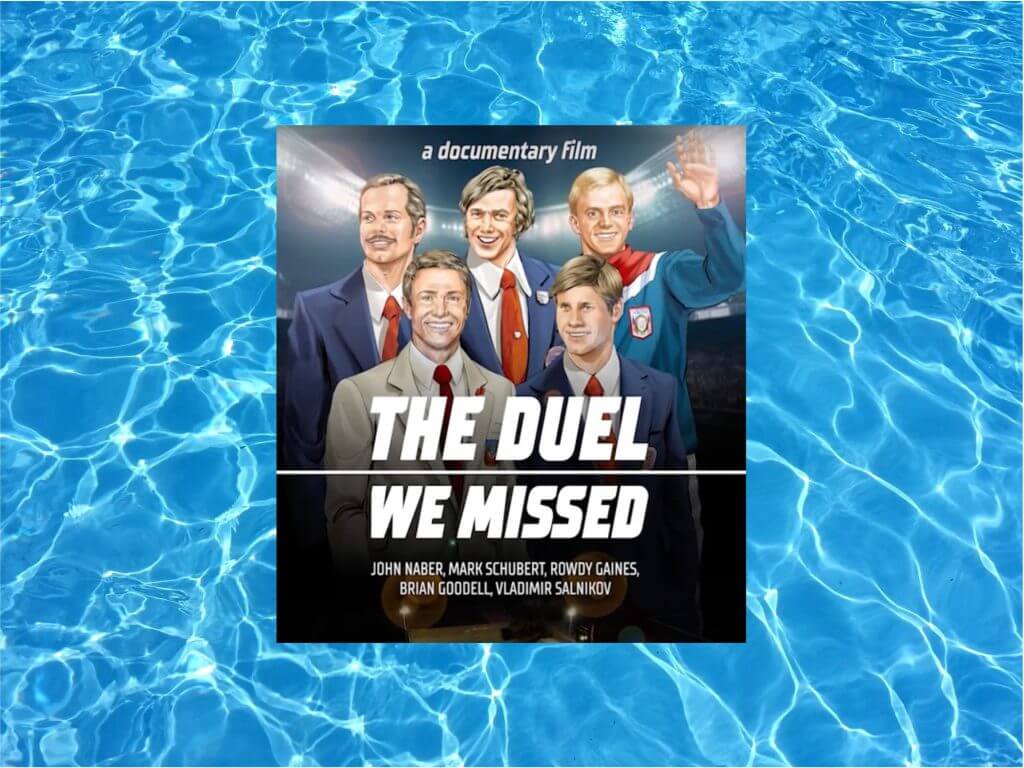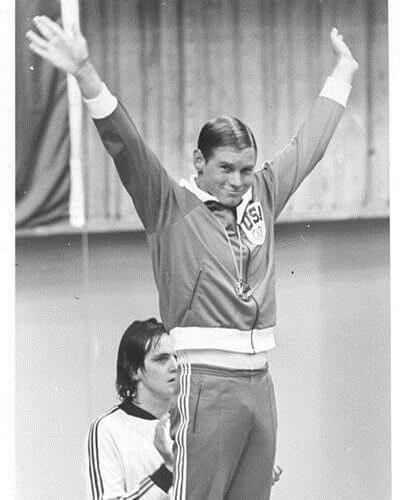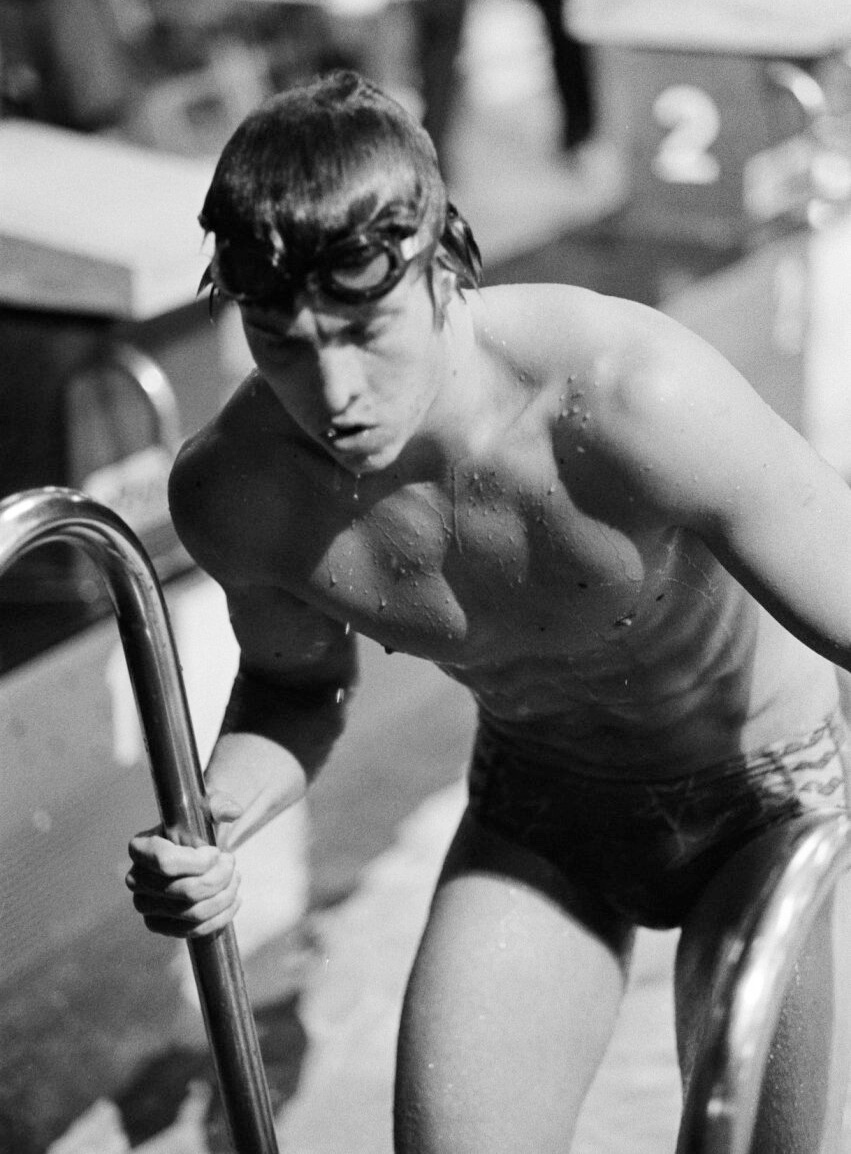Brian Goodell vs. Vladimir Salnikov: ‘The Duel We Missed’ Receiving Academy Award Consideration

Brian Goodell vs. Vladimir Salnikov: ‘The Duel We Missed’ Documentary Receiving Academy Award Consideration
Documentary films, at their core, take a deep dive into a specific topic. They are detailed. They offer emotion. They introduce engaging characters and storylines. They take the viewer behind a curtain, often revealing elements of a tale that were never before presented, or might have gone overlooked.
“The Duel We Missed” checks those boxes.
Under consideration by The Academy of Motion Picture Arts and Sciences for a potential Oscar nomination in the documentary category, “The Duel We Missed” thoroughly and emotionally examines a tantalizing showdown that never materialized in the sport of swimming. In the late 1970s and early 1980s, the United States’ Brian Goodell and the Soviet Union’s Vladimir Salnikov were the premier distance-freestyle swimmers in the world, and a clash between the men was expected at the 1980 Olympic Games in Moscow.
 However, due to political interference, a duel between Goodell and Salnikov – with both men at the peak of their powers – was left to the imagination. “The Duel We Missed” delves deeply into the careers of Goodell and Salnikov, and their shared chase to become the first athlete in history to swim the 1500-meter freestyle in under 15 minutes. The documentary, produced by Bravo Films and directed by Ilnur Rafikov and Edward Staroselsky, also examines several complementary storylines – the political influence and boycotts of the 1980 and 1984 Olympics, athlete mentality, training of the era and the respect developed among individuals with like-minded goals.
However, due to political interference, a duel between Goodell and Salnikov – with both men at the peak of their powers – was left to the imagination. “The Duel We Missed” delves deeply into the careers of Goodell and Salnikov, and their shared chase to become the first athlete in history to swim the 1500-meter freestyle in under 15 minutes. The documentary, produced by Bravo Films and directed by Ilnur Rafikov and Edward Staroselsky, also examines several complementary storylines – the political influence and boycotts of the 1980 and 1984 Olympics, athlete mentality, training of the era and the respect developed among individuals with like-minded goals.
At the 1976 Olympic Games in Montreal, where the United States men won all but one gold medal in the 13 events contested, Goodell stormed to victory in the 400 and 1500 freestyle events, world records established in both. In the 1500 freestyle, Goodell was timed in 15:02.40, not far off the 15-minute barrier that was a target. Salnikov, a rising 16-year-old at the time, was fifth in the Montreal final, and while he finished off the podium, his prodigious talent suggested big things to come, including a rivalry with Goodell.
However, in the years ahead, multiple factors prevented Goodell and Salnikov from meeting while the men were at the top of their prowess. Goodell missed the 1978 World Championships, where Salnikov won gold medals in the 400 freestyle and 1500 freestyle, the longer event not far off Goodell’s world record. And as the 1980 Olympics neared, a hammer dropped on a potential duel in Moscow when U.S. President Jimmy Carter announced the United States would boycott the Games due to the Soviet Union’s invasion of Afghanistan.
Through the use of current-day interviews, highlighted by Goodell and Salnikov, “The Duel We Missed” takes both a wide-ranging and topic-specific look at the era. The feelings of Goodell and Salnikov were repeatedly shared, and their status in the sport was examined, including through the lens of Hall of Fame coach Mark Schubert, who was the mentor of Goodell. Also weighing in were Olympians John Naber and Rowdy Gaines, each sharing a perspective. Naber won three gold medals during his Team USA days and transitioned into a broadcasting career, which allowed him to interact with Salnikov and hear the Soviet star state that he was not a “true champion” without competing in a fully attended Olympic Games.
As for Gaines, now known as the Voice of Swimming for his work with NBC Sports, he provided personal stories about how the boycott impacted his life and career. Ultimately, Gaines returned to training after a brief retirement and won three gold medals at the 1984 Olympics in Los Angeles, and he spoke about seeing his dream through. Yet, Gaines also poignantly discussed the heartache of the Olympic hopefuls who did not get their chance on the biggest stage in sports.

Vladimir Salnikov. Photo Courtesy: Dutch National Archives
The documentary, which was perfectly organized, spanned 1976-1988, as it examined Salnikov dealing with the Soviet Union’s retaliatory boycott of the 1984 Games and his triumphant return to win gold in the 1500 freestyle at the 1988 Games in Seoul. The film also provided footage of Salnikov cracking the 15-minute barrier for the first time, an accomplishment that will live on as a distinguished achievement in the sport.
Among other standout moments from the documentary:
- Footage and interviews from a Soviet Union trip to the United States which allowed for training under Schubert’s guidance. The memories shared from this time were genuine and both illustrated respect among athletes, and how the Soviet Union learned about the intensity of Schubert’s workouts in Mission Viejo, California.
- Schubert, in this current era, telling Goodell that he wished he had not retired following the boycott, and Goodell stating that he had a few reservations about his decision as the 1984 Games neared.
- The playing of the Soviet national anthem following Salnikov’s victory at the 1988 Olympics, one of the final times the anthem was played before the breakup of the USSR. More, the story of Salnikov being lauded by his fellow athletes in the dining hall in Seoul on the night of his 1500 freestyle victory elicited goosebumps, and emphasized the appreciation Olympians share for each other.
- The illustrations and graphics used during the documentary were sensational, providing the feel of a comic book and celebrating the individuals and moments featured.
- The emotion expressed throughout the 90-minute documentary was tremendous. Tears flowed. Words were sometimes difficult to find. Admiration was constantly evident.
- A phone call late in the film between Goodell, Schubert and Salnikov was a wonderful touch, and further emphasized the respect that permeated the film and the careers of all three men.
“The Duel We Missed” is an extraordinary film, exactly what a special documentary should be. Years of work, research and interviews went into making this film and bringing the story of Goodell and Salnikov to viewers. Swim fans, especially those with an understanding of the rich history of the sport, will appreciate it. But casual viewers will also find themselves engaged, enraptured by a story that has emotion, intensity, goal-chasing and more.
Sadly, a showdown between Brian Goodell and Vladimir Salnikov in their prime was missed. But “The Duel We Missed” pays beautiful homage to the athletes and the era, and what might have been.



